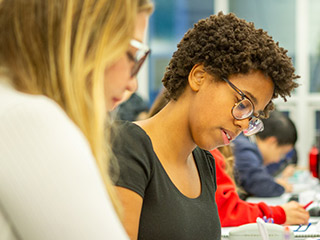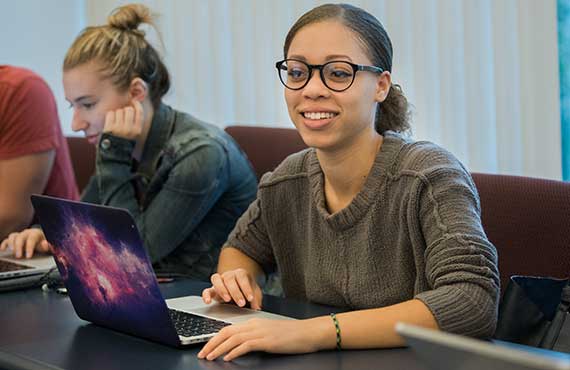

Accelerate Change
We envision a world in which women are fully represented - and thriving - as technological contributors, leaders, and innovators.


Accelerate Change
We envision a world in which women are fully represented - and thriving - as technological contributors, leaders, and innovators.


Accelerate Change
We envision a world in which women are fully represented - and thriving - as technological contributors, leaders, and innovators.


Accelerate Change
We envision a world in which women are fully represented - and thriving - as technological contributors, leaders, and innovators.
Founded in 2019, the Center for Inclusive Computing at Northeastern University partners with colleges and universities to materially increase the representation of women computing graduates. These partnerships focus on addressing and removing the institutional barriers that exclude women of all races and ethnicities from discovering and thriving in computing programs.
In order to accelerate change, we partner with schools on three key initiatives:
Founded in 2019, the Center for Inclusive Computing at Northeastern University partners with colleges and universities to materially increase the representation of women computing graduates. These partnerships focus on addressing and removing the institutional barriers that exclude women of all races and ethnicities from discovering and thriving in computing programs.
In order to accelerate change, we partner with schools on three key initiatives:
Founded in 2019, the Center for Inclusive Computing at Northeastern University partners with colleges and universities to materially increase the representation of women computing graduates. These partnerships focus on addressing and removing the institutional barriers that exclude women of all races and ethnicities from discovering and thriving in computing programs.
In order to accelerate change, we partner with schools on three key initiatives:
Founded in 2019, the Center for Inclusive Computing at Northeastern University partners with colleges and universities to materially increase the representation of women computing graduates. These partnerships focus on addressing and removing the institutional barriers that exclude women of all races and ethnicities from discovering and thriving in computing programs.
In order to accelerate change, we partner with schools on three key initiatives:

We offer two types of grants to colleges and universities committed to improving the representation of women graduating with computing degrees: Implementation and Diagnostic.

We offer two types of grants to colleges and universities committed to improving the representation of women graduating with computing degrees: Implementation and Diagnostic.

We offer two types of grants to colleges and universities committed to improving the representation of women graduating with computing degrees: Implementation and Diagnostic.

We offer two types of grants to colleges and universities committed to improving the representation of women graduating with computing degrees: Implementation and Diagnostic.

We collaborate with participating colleges and universities, from the application to implementation. Technical Advisors, nationally recognized computing faculty, are on hand throughout the life of the grant to support design, execution, and analysis.

We collaborate with participating colleges and universities, from the application to implementation. Technical Advisors, nationally recognized computing faculty, are on hand throughout the life of the grant to support design, execution, and analysis.

We collaborate with participating colleges and universities, from the application to implementation. Technical Advisors, nationally recognized computing faculty, are on hand throughout the life of the grant to support design, execution, and analysis.

We collaborate with participating colleges and universities, from the application to implementation. Technical Advisors, nationally recognized computing faculty, are on hand throughout the life of the grant to support design, execution, and analysis.

Collecting data is a critical aspect of the work and every grantee participates. We seek to gain a deeper understanding of how students are faring in introductory computing and where interventions are necessary.

Collecting data is a critical aspect of the work and every grantee participates. We seek to gain a deeper understanding of how students are faring in introductory computing and where interventions are necessary.

Collecting data is a critical aspect of the work and every grantee participates. We seek to gain a deeper understanding of how students are faring in introductory computing and where interventions are necessary.

Collecting data is a critical aspect of the work and every grantee participates. We seek to gain a deeper understanding of how students are faring in introductory computing and where interventions are necessary.



